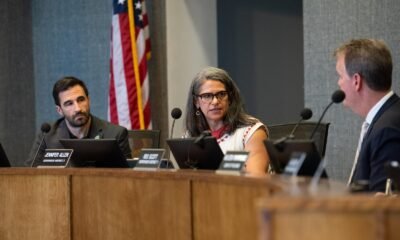border
Pima Supervisors Set to Choose New Member as Oro Valley Looks to Revamp Town Center

Former state Rep. Andrés Cano appears poised to become the front-runner for the District 5 seat on the Pima County Board of Supervisors, a position recently vacated by Adelita Graijalva, who resigned to pursue her father’s congressional seat. Though Cano has a strong political background, including experience in the District 5 office and stints at Harvard University, history suggests that frontrunner status does not guarantee success. Six candidates have expressed interest in filling the role, which offers an annual salary exceeding $96,000.
Cano’s strong ties to Tucson politics and progressive initiatives position him well, but Pima Community College Governing Board member Karla Morales may pose a significant challenge as a dark horse candidate. Lessons from previous Board appointments remind us that unexpected outcomes can arise. For instance, Richard Elías elevated his status after giving a forceful speech while campaigning to replace Raúl Grijalva, illustrating that perceived favorites can face unexpected turns.
Within the complex dynamics at play, Cano needs to remain vigilant against other contenders like engineer Cynthia Abril Sosa Ontiveros, retired teacher Lewis David Araiza, Sr., county employee Kimberly Baeza, and retiree Richard Hernandez. Grijalva’s passing has created a competitive landscape where sudden shifts are possible, especially given that the Board has previously encouraged applicants to commit to not seeking full terms, a stipulation absent this time.
Meanwhile, tensions between the Tucson City Council and Pima County are heating up again as officials consider raising drinking water rates for county residents. The county plans to vote on a resolution opposing this increase, citing a need for evidence-based justification. Several years ago, a similar attempt was thwarted by a county lawsuit that proved successful. Local officials now face the challenge of balancing urban services amidst ongoing droughtt. This situation threatens to further complicate the cooperative relationship between the city and the county.
In a related matter, County Administrator Jan Lesher is expected to discuss cautionary communications from FEMA regarding potential financial ramifications for local asylum-seeking programs. The agency’s hostile tone raises concerns about funding already allocated for addressing federal responsibilities. Lesher’s words express frustration towards federal overreach, mirroring sentiments among local governments that are working diligently to manage issues arising from shortfalls in federal policy.
Amid these challenges, the Pima County Board of Supervisors is preparing to explore multiple federal funding opportunities, including a consolidated action plan to secure $2.8 million for local projects. Requests from organizations like Habitat for Humanity and the YWCA of Southern Arizona underscore an effort to direct critical resources to communities in need, despite debates surrounding potential inefficiencies in leveraging nonprofit agencies.
In the wake of budget discussions, the county faces uncertainty regarding revenue projections; as officials prepare for the possibility of varying economic scenarios, they must maintain a comprehensive approach to budgeting. Addressing climate action alongside economic development will further complicate the Board’s agenda. Supervisors will receive updates on initiatives to enhance wildfire preparedness and combat climate challenges, recognizing that public sentiment around climate change remains mixed amidst political shifts.
In Oro Valley, a $12.6 million loan to finalize the Northwest Recharge, Recovery and Delivery System is on the agenda, reflecting ongoing efforts to enhance local water infrastructure. The council is also considering amendments to the town’s downtown development plans, introducing new height restrictions intended to preserve community character.
Finally, the Santa Cruz County Board of Supervisors is preparing to approve a slate of judges and justices of the peace for the coming term. While most candidates are designated as temporary or part-time positions, the appointment process underscores ongoing efforts to adapt to regional judicial needs.

















